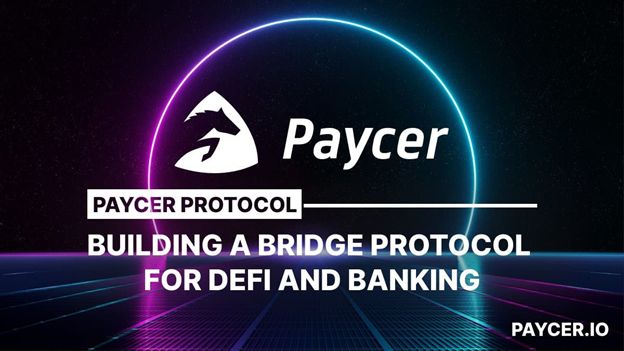- Innovative bridge protocol will allow retail clients to reap the rewards of the lucrative Decentralized Finance ecosystem
Paycer, a Hamburg-based financial services firm specialized in cryptocurrencies and Decentralized Finance (DeFi), is currently developing a bridge protocol that will aggregate DeFi and cross-chain crypto services and combine them with traditional banking services. Expected to come online in early 2022, the protocol will feature a range of novel financial products designed to help retail clients reap the rewards of the DeFi market.
“Using DeFi can be pretty difficult, even for those in the IT industry. Our mission is to bring high DeFi yields to retail clients who aren’t invested in cryptocurrency yet,” Paycer’s CTO Nils Gregersen says. “We’re also targeting investors who are already in crypto, but who still haven’t jumped on the DeFi bandwagon.”

Providing full interoperability across multiple blockchains, the protocol and platform will feature the full range of financial services, including crypto wallets, bank accounts, lending, liquidity pools and – most importantly – streamlined access to the lucrative DeFi market.
High Interest Rates in a Low-Interest World
One of the platform’s most attractive features is that it promises to offer exceptionally high rates of interest. In today’s low-interest financial environment, this will come as a relief to many retail investors, who will be able to use the Paycer protocol to tap into DeFi and thereby generate viable passive incomes.
“Many people today are seeing their savings gradually diminish because they aren’t earning any interest on it. In fact, they’re losing about 2 to 5 percent of their wealth every year to inflation,” Gregersen explains. “Decentralized Finance, by contrast, offers excellent interest-rate opportunities, while having the added advantage of not being dependent on banks.”
Because cryptocurrencies are notoriously volatile, some investors may have reservations about dipping into the DeFi market, which is still a relatively new phenomenon. The Paycer Platform, however, will help users mitigate risk by assessing the viability of new DeFi products before investing in them. It will also conduct multiple checks in advance, automatically shifting users’ assets away from any investments deemed to be overly risky.
Enter PCR: Paycer’s Utility Token
As part of the rollout of its DeFi protocol, Paycer will also be offering a utility token (PCR), which will generate real value for users of the platform, where token-holders will enjoy voting rights. Four percent of these tokens are available for pre-sale (at a discount), and another 5 percent will be offered in a subsequent public sale.
By staking PCR tokens on the Paycer DeFi platform users can earn staking rewards. What’s more, Paycer will use some of the profits it earns for token buybacks, thus ensuring steady demand – and stable prices – for its flagship cryptocurrency.
“Since Paycer believes in a regulated implementation, the PCR utility token was designed in accordance with the applicable German financial laws in cooperation with a specialized blockchain law firm. The token was also sent to the German Federal Financial Supervisory Authority (BaFin) for review”, says Gregersen.
How you can participate in Paycer’s pre-sale
To participate in the PCR token pre-sale you need to visit Paycer’s website: https://www.paycer.io/token-sale there you can apply for the sale and process your KYC via Blockpass. The KYC is required because Paycer is a legal German company and follows money laundering and anti-terror laws. After the KYC is processed users will receive an email with further instructions from Paycer.
Why CeDeFi and regulation is needed for mass DeFi adoption?
Experienced crypto investors are used to accepting higher risks with their investments. They are also used to investing large amounts in new platforms and anonymous teams. The use of their own wallet and various blockchain networks is also no problem for experienced crypto users. But for retail customers all this will not work, when the first private keys are lost the anger will be big. Retail clients will also not invest much money in hidden DeFi platforms, because they probably think crypto is a scam anyway. Therefore, for mass adoption fiat on-ramp and crypto custody are needed to reduce complexity. Regulation will be needed as a trust builder for the retail clients to gain faith in the new decentralized financial products.
Why Paycer’s approach will be successful?
Paycer focuses on ease of use and regulation when developing its products from day one. The Paycer team is thus following its long-term vision for the company and will be able to build up the trust of investors and customers. We are convinced that CeDeFi will establish itself in the mid to long term and that Paycer will then already have secured a good position in the market.
What is the difference between Paycer and other DeFi products?
Many DeFi products are run by anonymous teams from somewhere in the world. For these platforms rapid development and high interest rates are more important than the long-term success of the platform. Paycer is working to establish itself as a reliable and secure DeFi and CeDeFi brand in the long run. The Paycer team takes the more difficult route in order to work in compliance with the law. But it will be this way that can open the DeFi market to the majority of people.
Social Links:
Twitter: https://twitter.com/paycerprotocol
Telegram: https://t.me/paycerprotocol
Instagram: https://www.instagram.com/paycer_protocol/
Linkedin: https://www.linkedin.com/company/paycer
Media Contact:
Richard Vo, CEO, Paycer UG
E-mail: hello@paycer.io
Website: https://www.paycer.io
SOURCE: Paycer UG















